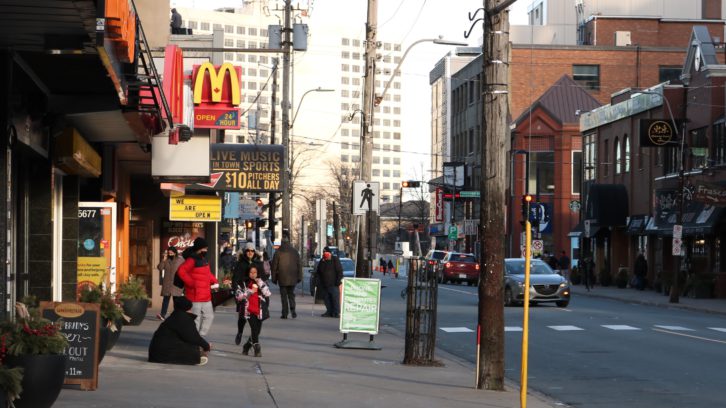Vaccinating people experiencing homelessness will be community effort, Halifax experts say
This vulnerable group is five times more likely to die from COVID-19

caption
Jeff Karabanow, a professor of social work at Dalhousie University and co-founder of Out of the Cold, HalifaxExperts say community groups are vital to distributing the two-dose COVID-19 vaccine among Halifax’s growing homeless population.
According to the Affordable Housing Association of Nova Scotia, there are 489 people experiencing homelessness in the Halifax Regional Municipality as of Tuesday, an increase of almost 300 per cent from this time last year.
“In the first lockdown, with public places being closed, we didn’t know where people went. Some of them were outside, but a lot just vanished,” said Eric Jonsson, an outreach worker and program co-ordinator at Navigator Street Outreach.
Jeff Karabanow, a professor of social work at Dalhousie University and co-founder of Halifax’s Out of the Cold shelter, anticipates logistical challenges in bringing a two-dose vaccine to those experiencing homelessness.
However, he remains confident that these challenges are “not insurmountable.”
“There are a number of very important NGOs and outreach workers with deep connections to these populations,” he said. “We need to rely on informal systems that are much more trusted by marginal populations.
“In Halifax, though, we have been very lucky. We didn’t have shelter outbreaks like they did in Toronto and Montreal.”
Homeless populations especially vulnerable: study
Meanwhile, the federal government’s immunization plan is being rolled out to “enable as many Canadians as possible to be immunized as quickly as possible against COVID-19, while ensuring that high-risk populations are prioritized.”
A phased approach is being taken in each province, with health-care workers, seniors, and those in long-term care slotted to receive the first vaccines.
In Nova Scotia, the first phase is already underway, with Phase 2 expected to begin in May. This will prioritize “remaining health-care workers and essential workers.” Phase 3 will include “all Nova Scotians who are not part of the phase one and two priority groups.”
A recent study from Ontario illustrates how people struggling with homelessness are particularly vulnerable to the virus. From January to July 2020, during the first wave of the virus, this population was over 20 times more likely to be hospitalized, over 10 times more likely to be admitted to the ICU, and over five times more likely to die within 21 days of being diagnosed with COVID-19.

caption
A view from Spring Garden Road. Homelessness in Halifax has increased almost 300 per cent over the last year.During the COVID-19 briefing on Tuesday, Dr. Robert Strang, Nova Scotia’s chief medical officer of health, clarified that “those living in aggregate living situations such as shelters” are one of the priority groups to receive the vaccine.
“We have already been having conversations with our community organizations to support people that are homeless around COVID protocols and testing. When the time is right, we’ll include discussions about vaccination as well. This is one of the areas we will potentially see using our mobile health plans to [immunize those in shelters],” he said.
However, the possibility of a shelter outbreak and another lockdown threatens to undermine Jonsson’s and Karabanow’s plans to track and administer vaccinations.
“We’re going to have to work together to find people to make sure they get the second dose of their vaccination,” said Jonsson.
Rick Swaine, a nurse at Mobile Outreach Street Health (MOSH), also anticipates a few challenges to distributing the vaccine among the homeless.
“Phones have made it much easier [to track people], but some people don’t have phones. And I’m not sure how mobile the vaccine is between distribution centres, since it is required to be kept at a cool temperature,” Swaine said.
The Pfizer vaccine may be the solution. As Strang said Tuesday, it is easier to transport, which has made it ideal for long-term care homes. This could also work for “mobile units” and frontline clinics such as MOSH that will be essential in immunizing people experiencing homelessness.
Swaine agrees with Karabanow that shelters in Nova Scotia have been lucky.
“I would have to credit the overall population health measures. There were shelters put in place and hotels that were provided for folks being tested,” he said.
“It was a combination of luck and overall population planning that helped us avoid the worst of it.”
Resources for those experiencing homelessness in the Halifax Regional Municipality:
About the author
Kunal Chaudhary
Kunal Chaudhary is a reporter with The Signal based in Toronto, Ontario.
Alexandrea Guye
Alexandrea Guye is a journalist with The Signal located in Kjipuktuk/Halifax. She loves the outdoors and is interested in local stories, human...
